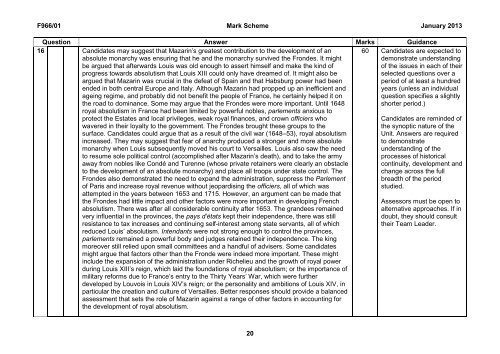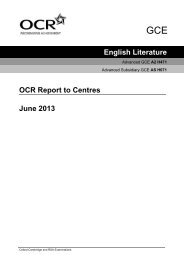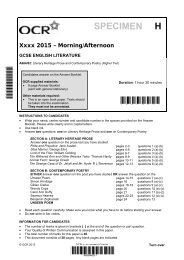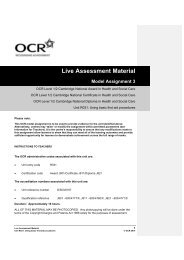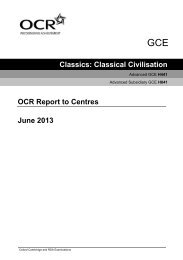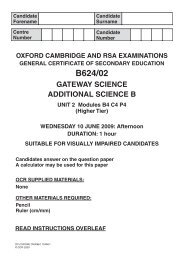Mark scheme - Unit F966/01 - Historical themes - Option A - OCR
Mark scheme - Unit F966/01 - Historical themes - Option A - OCR
Mark scheme - Unit F966/01 - Historical themes - Option A - OCR
You also want an ePaper? Increase the reach of your titles
YUMPU automatically turns print PDFs into web optimized ePapers that Google loves.
<strong>F966</strong>/<strong>01</strong> <strong>Mark</strong> Scheme January 2<strong>01</strong>3<br />
Question Answer <strong>Mark</strong>s Guidance<br />
16 Candidates may suggest that Mazarin’s greatest contribution to the development of an<br />
absolute monarchy was ensuring that he and the monarchy survived the Frondes. It might<br />
be argued that afterwards Louis was old enough to assert himself and make the kind of<br />
progress towards absolutism that Louis XIII could only have dreamed of. It might also be<br />
argued that Mazarin was crucial in the defeat of Spain and that Habsburg power had been<br />
ended in both central Europe and Italy. Although Mazarin had propped up an inefficient and<br />
ageing regime, and probably did not benefit the people of France, he certainly helped it on<br />
the road to dominance. Some may argue that the Frondes were more important. Until 1648<br />
royal absolutism in France had been limited by powerful nobles, parlements anxious to<br />
protect the Estates and local privileges, weak royal finances, and crown officiers who<br />
wavered in their loyalty to the government. The Frondes brought these groups to the<br />
surface. Candidates could argue that as a result of the civil war (1648–53), royal absolutism<br />
increased. They may suggest that fear of anarchy produced a stronger and more absolute<br />
monarchy when Louis subsequently moved his court to Versailles. Louis also saw the need<br />
to resume sole political control (accomplished after Mazarin’s death), and to take the army<br />
away from nobles like Condé and Turenne (whose private retainers were clearly an obstacle<br />
to the development of an absolute monarchy) and place all troops under state control. The<br />
Frondes also demonstrated the need to expand the administration, suppress the Parlement<br />
of Paris and increase royal revenue without jeopardising the officiers, all of which was<br />
attempted in the years between 1653 and 1715. However, an argument can be made that<br />
the Frondes had little impact and other factors were more important in developing French<br />
absolutism. There was after all considerable continuity after 1653. The grandees remained<br />
very influential in the provinces, the pays d’états kept their independence, there was still<br />
resistance to tax increases and continuing self-interest among state servants, all of which<br />
reduced Louis’ absolutism. Intendants were not strong enough to control the provinces,<br />
parlements remained a powerful body and judges retained their independence. The king<br />
moreover still relied upon small committees and a handful of advisers. Some candidates<br />
might argue that factors other than the Fronde were indeed more important. These might<br />
include the expansion of the administration under Richelieu and the growth of royal power<br />
during Louis XIII’s reign, which laid the foundations of royal absolutism; or the importance of<br />
military reforms due to France’s entry to the Thirty Years’ War, which were further<br />
developed by Louvois in Louis XIV’s reign; or the personality and ambitions of Louis XIV, in<br />
particular the creation and culture of Versailles. Better responses should provide a balanced<br />
assessment that sets the role of Mazarin against a range of other factors in accounting for<br />
the development of royal absolutism.<br />
60 Candidates are expected to<br />
demonstrate understanding<br />
of the issues in each of their<br />
selected questions over a<br />
period of at least a hundred<br />
years (unless an individual<br />
question specifies a slightly<br />
shorter period.)<br />
Candidates are reminded of<br />
the synoptic nature of the<br />
<strong>Unit</strong>. Answers are required<br />
to demonstrate<br />
understanding of the<br />
processes of historical<br />
continuity, development and<br />
change across the full<br />
breadth of the period<br />
studied.<br />
Assessors must be open to<br />
alternative approaches. If in<br />
doubt, they should consult<br />
their Team Leader.<br />
20


